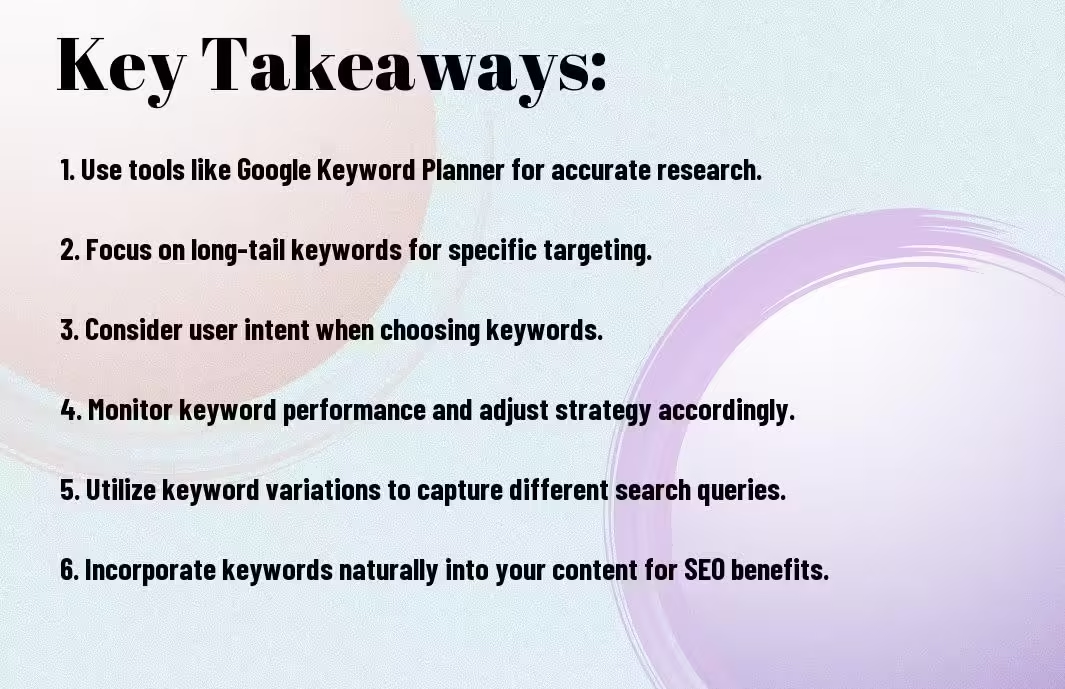There’s no denying the power of keyword research when it comes to SEO success. By understanding the keywords your target audience is searching for, you can optimize your website to rank higher in search engine results. In this blog post, we will explore how you can maximize your SEO efforts through effective keyword research, helping you reach a broader audience and drive more organic traffic to your website.
Key Takeaways:
- Understanding the search intent behind keywords is crucial for effective keyword research.
- Utilize long-tail keywords to target specific and niche audiences.
- Regularly analyze keyword performance and adjust your strategy based on the data.
- Optimize your website content, meta tags, and headers with relevant keywords.
- Utilize tools like Google Keyword Planner and SEMrush to identify high-performing keywords.

The Importance of Keyword Research
Why Keyword Research Matters in SEO
Research shows that keyword research is the foundation of any successful SEO strategy. By identifying the right keywords that your target audience is searching for, you can optimize your website to appear in search engine results pages (SERPs) when people look for information related to your business. Effective keyword research helps you understand the market and what your potential customers are interested in.
The Consequences of Ignoring Keyword Research
One of the biggest mistakes you can make in SEO is neglecting keyword research. Failure to conduct keyword research can result in poor search engine visibility, targeting the wrong audience, and ultimately losing out on potential customers. Without optimizing your website for relevant keywords, you risk falling behind your competitors who are utilizing this crucial SEO strategy.
Consequences can include decreased website traffic, lower conversion rates, and missed opportunities to expand your online presence. By ignoring keyword research, you are crucially limiting your website’s potential to reach a larger audience and drive organic traffic to your site.

Identifying Your Target Audience
Some of the most crucial aspects of maximizing your SEO efforts with keyword research involve understanding your target audience. By identifying who your potential customers are, you can tailor your content and keywords to better meet their needs and preferences.
Understanding Your Customer’s Needs and Pain Points
Your first step in identifying your target audience is understanding your customer’s needs and pain points. What are they looking for when they search online? What problems are they trying to solve? By identifying these crucial factors, you can create content that resonates with your audience and drives organic traffic to your website.
Creating Buyer Personas for Keyword Research
Needs
Your next step is to create buyer personas for your target audience. **By developing detailed profiles** of your ideal customers, including demographics, behaviors, and interests, you can better understand what keywords they are likely to use in their searches. This information is invaluable for optimizing your website and content to attract the right audience.
Another necessary aspect of creating buyer personas is **ensuring that you are constantly updating** them based on new data and feedback. Consumer behaviors and preferences can evolve over time, so it’s necessary to stay updated to maintain the effectiveness of your keyword research strategies. By regularly refining your buyer personas, you can ensure that your SEO efforts remain targeted and successful.
Keyword Research Tools and Techniques
Unlike traditional marketing strategies, SEO requires a keen focus on keywords that your target audience is using. Utilizing keyword research tools can help you refine your strategy and reach your audience more effectively.
Google Keyword Planner: A Beginner’s Guide
An vital tool for anyone starting with SEO is the Google Keyword Planner. This tool allows you to research keywords, analyze their search volumes, and competition levels. By using this tool, you can identify relevant keywords to target and optimize your content for better search engine visibility.
Alternative Keyword Research Tools: Ahrefs, SEMrush, and Moz
To take your keyword research to the next level, consider utilizing tools like Ahrefs, SEMrush, and Moz. These tools offer advanced features such as competitor analysis, keyword difficulty scoring, and content gap analysis. By leveraging these tools, you can uncover valuable insights and stay ahead of the competition in your SEO efforts.
To maximize the potential of these tools, you can track keyword rankings, monitor backlinks, and identify new keyword opportunities to further optimize your content strategy.
Long-Tail Keywords: Unlocking Hidden Opportunities
With the rise of voice search and natural language queries, targeting long-tail keywords has become increasingly important in SEO. These keywords are more specific and have lower competition, allowing you to attract highly targeted traffic to your website. By incorporating long-tail keywords into your content strategy, you can unlock hidden opportunities and improve your search engine rankings.
Keyword research is a continuous process that requires monitoring, analyzing, and adapting to stay relevant in the ever-changing digital landscape. By incorporating these keyword research tools and techniques into your strategy, you can maximize your SEO efforts and drive organic traffic to your website.
Analyzing Keyword Data
Keyword Volume: What It Means and How to Use It
All the keyword research in the world won’t help if you’re not targeting the right search terms. One crucial aspect to consider is keyword volume. This metric tells you how many times a specific keyword is searched for over a certain period. Understanding keyword volume can help you prioritize which keywords to focus on. High volume keywords can drive more traffic to your site, but they are also more competitive. On the other hand, low volume keywords may have less competition but could bring in fewer visitors. Striking a balance between the two is key to a successful SEO strategy.
Keyword Competition: Assessing the Landscape
When analyzing keyword data, assessing the competition for each keyword is crucial. Analyzing the keyword competition will help you understand how difficult it will be to rank for a particular keyword. High competition keywords are often targeted by established websites with authority, making it challenging for newer sites to compete. Low competition keywords may be easier to rank for but could also have lower search volumes. It’s imperative to find keywords with a good balance of search volume and competition to optimize your SEO efforts effectively.
For instance, if you’re a new blog in the fitness niche, targeting keywords like “lose weight” may be too competitive. Instead, focusing on long-tail keywords like “effective weight loss tips for beginners” can help you attract a more specific audience and have a better chance of ranking higher in search results.
Keyword Relevance: Ensuring Alignment with Your Content
Ensuring that your selected keywords are relevant to your content is crucial for SEO success. Your keywords should align with the topics you cover on your website to drive organic traffic that converts. Relevant keywords not only help search engines understand the context of your content but also attract users who are genuinely interested in what you offer. This alignment can improve your click-through rates and overall user engagement, positively impacting your SEO performance.
Competition in the digital landscape is fierce, and using keyword research to find relevant, high-volume keywords with manageable competition is key to standing out online. By understanding keyword volume, competition, and relevance, you can fine-tune your SEO strategy and maximize your efforts to drive targeted traffic to your website.
Creating Keyword-Optimized Content
Once again, you are reminded of the importance of creating keyword-optimized content to boost your SEO efforts. Crafting compelling titles and meta descriptions, writing keyword-rich headings and subheadings, and incorporating keywords naturally into your content are all crucial steps in maximizing your online visibility.
Crafting Compelling Titles and Meta Descriptions
Titles are the first thing users see when they come across your website on search engine result pages. Make sure your titles are not only catchy but also include relevant keywords that reflect the content of the page. Meta descriptions play a role in click-through rates, so use this space wisely to entice users to click on your link.
Writing Keyword-Rich Headings and Subheadings
Titles are not just for aesthetics; they serve as signposts for both readers and search engines, guiding them through your content. By strategically incorporating keywords into your headings and subheadings, you are not only making your content more readable but also signaling to search engines about the main topics discussed in your content.
To improve readability and SEO, keep your headings and subheadings clear, concise, and relevant to the content that follows. Do not forget, search engines value well-structured content that is easy for users to navigate.
Incorporating Keywords Naturally into Your Content
Keyword-Optimized content doesn’t mean stuffing your articles with keywords unnaturally. Instead, focus on integrating your target keywords seamlessly into your content, ensuring it flows naturally and provides value to the reader. Balancing optimization with user experience is key to ranking well on search engines while maintaining reader engagement.
Your content should be informative, engaging, and relevant to your target audience. By incorporating keywords naturally into your content, you can improve your search engine ranking while providing valuable information to your readers.
Refining Your Keyword Strategy
Identifying and Eliminating Negative Keywords
For refining your keyword strategy, it’s crucial to identify and eliminate negative keywords. **Negative keywords** are terms that are irrelevant to your business or attract the wrong audience. By incorporating negative keywords into your campaigns, you can **prevent your ads** from showing to users who are unlikely to convert. This saves you money by **targeting only** the most relevant audience.
Refining Your Keyword List for Better Results
Your keyword list is the core of your SEO strategy. **Refining** it regularly is a key step in optimizing your efforts. **Review** the performance of each keyword and **eliminate** ones that are not driving results. **Add** new keywords based on search trends and **user behavior**. This constant refinement ensures that you are **targeting** the right audience effectively.
**Ensure** that your keywords are **specific** and **relevant** to your content. **Avoid** generic keywords that are highly competitive and may not **attract** the right audience. **Use** long-tail keywords to **capture intent** and drive **quality traffic** to your site.
Adapting to Algorithm Updates and Trends
Your SEO strategy should be **flexible** and adaptable to **algorithm updates and trends** in the digital marketing landscape. **Stay informed** about the latest changes in search engine algorithms and **adjust** your keyword strategy accordingly. **Monitor** trends in your industry and **optimize** your keywords to **align** with current search behaviors.
**Results** in SEO are **dynamic**, and **adapting** to these changes ensures that your strategy remains **effective** and **competitive**. By **staying** ahead of algorithm updates and trends, you can **maintain** a strong **online presence** and **drive** valuable **traffic** to your website.
To wrap up
So, now that you understand the crucial role that keyword research plays in maximizing your SEO efforts, it’s time to put this knowledge into action. Bear in mind, keywords are the foundation of your SEO strategy, helping you attract the right audience and improve your search engine rankings. By conducting thorough keyword research, analyzing your competition, and optimizing your content accordingly, you can boost your organic traffic and achieve your digital marketing goals. Stay consistent, monitor your progress, and continuously refine your keyword strategy to stay ahead in the ever-evolving world of SEO. With dedication and the right tools, you can position your website for success and reach a wider audience online.
FAQ
Q: What is keyword research?
A: Keyword research is the process of identifying popular words and phrases that people enter into search engines, with the goal of optimizing content to match those terms and improve search engine rankings.
Q: Why is keyword research important for SEO?
A: Keyword research helps you understand what your target audience is searching for online, allowing you to create content that aligns with their needs and interests. This, in turn, improves your website’s visibility and organic traffic through search engines.
Q: How can I identify the right keywords for my website?
A: Start by brainstorming topics related to your business, products, or services. Use keyword research tools like Google Keyword Planner, SEMrush, or Ahrefs to discover relevant keywords with high search volume and low competition. Consider long-tail keywords for more specific and targeted results.
Q: Should I focus on short-tail or long-tail keywords in my SEO strategy?
A: While short-tail keywords may have higher search volume, they are often more competitive. Long-tail keywords, on the other hand, are more specific and targeted, making it easier to rank for them. It’s recommended to include a mix of both short-tail and long-tail keywords in your SEO strategy for best results.
Q: How can I track the performance of my chosen keywords?
A: Monitor your keyword rankings and organic traffic using tools like Google Analytics and Google Search Console. Track changes in keyword positions, organic traffic, and conversions to evaluate the effectiveness of your keyword research and SEO efforts. Make adjustments as needed to optimize your keyword strategy over time.







